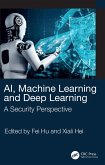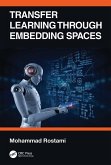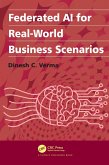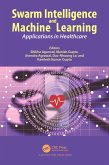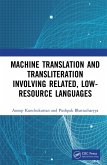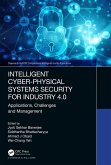AI, Machine Learning and Deep Learning (eBook, ePUB)
A Security Perspective
Redaktion: Hu, Fei; Hei, Xiali
46,95 €
46,95 €
inkl. MwSt.
Sofort per Download lieferbar

23 °P sammeln
46,95 €
Als Download kaufen

46,95 €
inkl. MwSt.
Sofort per Download lieferbar

23 °P sammeln
Jetzt verschenken
Alle Infos zum eBook verschenken
46,95 €
inkl. MwSt.
Sofort per Download lieferbar
Alle Infos zum eBook verschenken

23 °P sammeln
AI, Machine Learning and Deep Learning (eBook, ePUB)
A Security Perspective
Redaktion: Hu, Fei; Hei, Xiali
- Format: ePub
- Merkliste
- Auf die Merkliste
- Bewerten Bewerten
- Teilen
- Produkt teilen
- Produkterinnerung
- Produkterinnerung

Bitte loggen Sie sich zunächst in Ihr Kundenkonto ein oder registrieren Sie sich bei
bücher.de, um das eBook-Abo tolino select nutzen zu können.
Hier können Sie sich einloggen
Hier können Sie sich einloggen
Sie sind bereits eingeloggt. Klicken Sie auf 2. tolino select Abo, um fortzufahren.

Bitte loggen Sie sich zunächst in Ihr Kundenkonto ein oder registrieren Sie sich bei bücher.de, um das eBook-Abo tolino select nutzen zu können.
Today AI and Machine/Deep Learning have become the hottest areas in the information technology. This book aims to provide a complete picture on the challenges and solutions to the security issues in various applications. It explains how different attacks can occur in advanced AI tools and the challenges of overcoming those attacks.
- Geräte: eReader
- mit Kopierschutz
- eBook Hilfe
Andere Kunden interessierten sich auch für
![AI, Machine Learning and Deep Learning (eBook, PDF) AI, Machine Learning and Deep Learning (eBook, PDF)]() AI, Machine Learning and Deep Learning (eBook, PDF)46,95 €
AI, Machine Learning and Deep Learning (eBook, PDF)46,95 €![Transfer Learning through Embedding Spaces (eBook, ePUB) Transfer Learning through Embedding Spaces (eBook, ePUB)]() Mohammad RostamiTransfer Learning through Embedding Spaces (eBook, ePUB)47,95 €
Mohammad RostamiTransfer Learning through Embedding Spaces (eBook, ePUB)47,95 €![Federated AI for Real-World Business Scenarios (eBook, ePUB) Federated AI for Real-World Business Scenarios (eBook, ePUB)]() Dinesh C. VermaFederated AI for Real-World Business Scenarios (eBook, ePUB)59,95 €
Dinesh C. VermaFederated AI for Real-World Business Scenarios (eBook, ePUB)59,95 €![Swarm Intelligence and Machine Learning (eBook, ePUB) Swarm Intelligence and Machine Learning (eBook, ePUB)]() Swarm Intelligence and Machine Learning (eBook, ePUB)51,95 €
Swarm Intelligence and Machine Learning (eBook, ePUB)51,95 €![Artificial Intelligence of Health-Enabled Spaces (eBook, ePUB) Artificial Intelligence of Health-Enabled Spaces (eBook, ePUB)]() Artificial Intelligence of Health-Enabled Spaces (eBook, ePUB)48,95 €
Artificial Intelligence of Health-Enabled Spaces (eBook, ePUB)48,95 €![Machine Translation and Transliteration involving Related, Low-resource Languages (eBook, ePUB) Machine Translation and Transliteration involving Related, Low-resource Languages (eBook, ePUB)]() Anoop KunchukuttanMachine Translation and Transliteration involving Related, Low-resource Languages (eBook, ePUB)57,95 €
Anoop KunchukuttanMachine Translation and Transliteration involving Related, Low-resource Languages (eBook, ePUB)57,95 €![Intelligent Cyber-Physical Systems Security for Industry 4.0 (eBook, ePUB) Intelligent Cyber-Physical Systems Security for Industry 4.0 (eBook, ePUB)]() Intelligent Cyber-Physical Systems Security for Industry 4.0 (eBook, ePUB)50,95 €
Intelligent Cyber-Physical Systems Security for Industry 4.0 (eBook, ePUB)50,95 €-
-
-
Today AI and Machine/Deep Learning have become the hottest areas in the information technology. This book aims to provide a complete picture on the challenges and solutions to the security issues in various applications. It explains how different attacks can occur in advanced AI tools and the challenges of overcoming those attacks.
Hinweis: Dieser Artikel kann nur an eine deutsche Lieferadresse ausgeliefert werden.
Dieser Download kann aus rechtlichen Gründen nur mit Rechnungsadresse in A, B, BG, CY, CZ, D, DK, EW, E, FIN, F, GR, HR, H, IRL, I, LT, L, LR, M, NL, PL, P, R, S, SLO, SK ausgeliefert werden.
Hinweis: Dieser Artikel kann nur an eine deutsche Lieferadresse ausgeliefert werden.
Produktdetails
- Produktdetails
- Verlag: Taylor & Francis eBooks
- Seitenzahl: 346
- Erscheinungstermin: 5. Juni 2023
- Englisch
- ISBN-13: 9781000878899
- Artikelnr.: 67694800
- Verlag: Taylor & Francis eBooks
- Seitenzahl: 346
- Erscheinungstermin: 5. Juni 2023
- Englisch
- ISBN-13: 9781000878899
- Artikelnr.: 67694800
- Herstellerkennzeichnung Die Herstellerinformationen sind derzeit nicht verfügbar.
Dr. Fei Hu is a professor in the department of Electrical and Computer Engineering at the University of Alabama. He has published over 10 technical books with CRC press. His research focus includes cyber security and networking. He obtained his Ph.D. degrees at Tongji University (Shanghai, China) in the field of Signal Processing (in 1999), and at Clarkson University (New York, USA) in Electrical and Computer Engineering (in 2002). He has published over 200 journal/conference papers and books. Dr. Hu's research has been supported by U.S. National Science Foundation, Cisco, Sprint, and other sources. He won the school's President's Faculty Research Award (<1% faculty were awarded each year) in 2020. Dr. Xiali (Sharon) Hei is an assistant professor in the School of Computing and Informatics at the University of Louisiana at Lafayette. Her research focus is cyber and physical security. Prior to joining the University of Louisiana at Lafayette, she was an assistant professor at Delaware State University from 2015-2017 and Frostburg State University 2014-2015. Sharon received his Ph.D. in computer science from Temple University in 2014, focusing on computer security.
Part I. Secure AI/ML Systems: Attack Models
1. Machine Learning Attack Models, 2. Adversarial Machine Learning: A New
Threat Paradigm for Next-generation Wireless Communications, 3. Threat of
Adversarial Attacks to Deep Learning: A Survey, 4. Attack Models for
Collaborative Deep Learning, 5. Attacks on Deep Reinforcement Learning
Systems: A Tutorial, 6. Trust and Security of Deep Reinforcement Learning,
7. IoT Threat Modeling using Bayesian Networks
Part II. Secure AI/ML Systems: Defenses
8. Survey of Machine Learning Defense Strategies, 9. Defenses Against Deep
Learning Attacks, 10. Defensive Schemes for Cyber Security of Deep
Reinforcement Learning, 11. Adversarial Attacks on Machine Learning Models
in Cyber-Physical Systems, 12. Federated Learning and Blockchain: An
Opportunity for Artificial Intelligence with Data Regulation
Part III. Using AI/ML Algorithms for Cyber Security
13. Using Machine Learning for Cyber Security: Overview, 14. Performance of
Machine Learning and Big Data Analytics Paradigms in Cyber Security, 15.
Using ML and DL Algorithms for Intrusion Detection in Industrial Internet
of Things.
Part IV. Applications
16. On Detecting Interest Flooding Attacks in Named Data Networking
(NDN)-based IoT Searches, 17. Attack on Fraud Detection Systems in Online
Banking Using Generative Adversarial Networks, 18. An Artificial
Intelligence-assisted Security Analysis of Smart Healthcare Systems, 19. A
User-centric Focus for Detecting Phishing Emails
1. Machine Learning Attack Models, 2. Adversarial Machine Learning: A New
Threat Paradigm for Next-generation Wireless Communications, 3. Threat of
Adversarial Attacks to Deep Learning: A Survey, 4. Attack Models for
Collaborative Deep Learning, 5. Attacks on Deep Reinforcement Learning
Systems: A Tutorial, 6. Trust and Security of Deep Reinforcement Learning,
7. IoT Threat Modeling using Bayesian Networks
Part II. Secure AI/ML Systems: Defenses
8. Survey of Machine Learning Defense Strategies, 9. Defenses Against Deep
Learning Attacks, 10. Defensive Schemes for Cyber Security of Deep
Reinforcement Learning, 11. Adversarial Attacks on Machine Learning Models
in Cyber-Physical Systems, 12. Federated Learning and Blockchain: An
Opportunity for Artificial Intelligence with Data Regulation
Part III. Using AI/ML Algorithms for Cyber Security
13. Using Machine Learning for Cyber Security: Overview, 14. Performance of
Machine Learning and Big Data Analytics Paradigms in Cyber Security, 15.
Using ML and DL Algorithms for Intrusion Detection in Industrial Internet
of Things.
Part IV. Applications
16. On Detecting Interest Flooding Attacks in Named Data Networking
(NDN)-based IoT Searches, 17. Attack on Fraud Detection Systems in Online
Banking Using Generative Adversarial Networks, 18. An Artificial
Intelligence-assisted Security Analysis of Smart Healthcare Systems, 19. A
User-centric Focus for Detecting Phishing Emails
Part I. Secure AI/ML Systems: Attack Models
1. Machine Learning Attack Models, 2. Adversarial Machine Learning: A New
Threat Paradigm for Next-generation Wireless Communications, 3. Threat of
Adversarial Attacks to Deep Learning: A Survey, 4. Attack Models for
Collaborative Deep Learning, 5. Attacks on Deep Reinforcement Learning
Systems: A Tutorial, 6. Trust and Security of Deep Reinforcement Learning,
7. IoT Threat Modeling using Bayesian Networks
Part II. Secure AI/ML Systems: Defenses
8. Survey of Machine Learning Defense Strategies, 9. Defenses Against Deep
Learning Attacks, 10. Defensive Schemes for Cyber Security of Deep
Reinforcement Learning, 11. Adversarial Attacks on Machine Learning Models
in Cyber-Physical Systems, 12. Federated Learning and Blockchain: An
Opportunity for Artificial Intelligence with Data Regulation
Part III. Using AI/ML Algorithms for Cyber Security
13. Using Machine Learning for Cyber Security: Overview, 14. Performance of
Machine Learning and Big Data Analytics Paradigms in Cyber Security, 15.
Using ML and DL Algorithms for Intrusion Detection in Industrial Internet
of Things.
Part IV. Applications
16. On Detecting Interest Flooding Attacks in Named Data Networking
(NDN)-based IoT Searches, 17. Attack on Fraud Detection Systems in Online
Banking Using Generative Adversarial Networks, 18. An Artificial
Intelligence-assisted Security Analysis of Smart Healthcare Systems, 19. A
User-centric Focus for Detecting Phishing Emails
1. Machine Learning Attack Models, 2. Adversarial Machine Learning: A New
Threat Paradigm for Next-generation Wireless Communications, 3. Threat of
Adversarial Attacks to Deep Learning: A Survey, 4. Attack Models for
Collaborative Deep Learning, 5. Attacks on Deep Reinforcement Learning
Systems: A Tutorial, 6. Trust and Security of Deep Reinforcement Learning,
7. IoT Threat Modeling using Bayesian Networks
Part II. Secure AI/ML Systems: Defenses
8. Survey of Machine Learning Defense Strategies, 9. Defenses Against Deep
Learning Attacks, 10. Defensive Schemes for Cyber Security of Deep
Reinforcement Learning, 11. Adversarial Attacks on Machine Learning Models
in Cyber-Physical Systems, 12. Federated Learning and Blockchain: An
Opportunity for Artificial Intelligence with Data Regulation
Part III. Using AI/ML Algorithms for Cyber Security
13. Using Machine Learning for Cyber Security: Overview, 14. Performance of
Machine Learning and Big Data Analytics Paradigms in Cyber Security, 15.
Using ML and DL Algorithms for Intrusion Detection in Industrial Internet
of Things.
Part IV. Applications
16. On Detecting Interest Flooding Attacks in Named Data Networking
(NDN)-based IoT Searches, 17. Attack on Fraud Detection Systems in Online
Banking Using Generative Adversarial Networks, 18. An Artificial
Intelligence-assisted Security Analysis of Smart Healthcare Systems, 19. A
User-centric Focus for Detecting Phishing Emails

